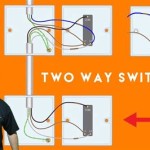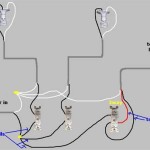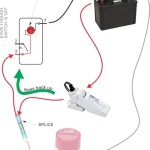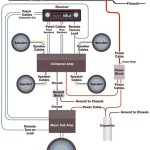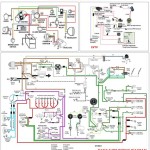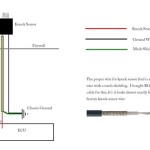A trailer wiring harness replacement involves replacing the electrical wiring system that connects a towing vehicle to a trailer. Typically, it includes replacing the electrical connectors, wires, and other components that provide power, lighting, and braking signals. This ensures proper communication and functionality between the vehicle and the trailer.
A new wiring harness can enhance safety and reliability by ensuring that all electrical systems operate properly. It can prevent malfunctions, such as taillight failures or brake light malfunctions, which could lead to road safety hazards. Additionally, it can improve the overall functionality of the trailer, enabling features like turn signals and reverse lights.
Historically, trailer wiring harnesses have evolved to meet changing vehicle and trailer designs. In earlier times, simple wiring setups were used, but with the increasing complexity of modern vehicles and trailers, wiring harnesses have become more sophisticated, incorporating advanced technologies and multiplexing capabilities.
As we delve into the details of trailer wiring harness replacements, we will explore the various types of harnesses available, their installation processes, and troubleshooting techniques. By understanding the intricacies of this essential component, we can ensure safe and efficient towing experiences.
When it comes to trailer wiring harness replacements, understanding the key aspects is crucial for ensuring a successful and efficient installation. These aspects cover various dimensions, each contributing to the overall effectiveness and safety of the towing system.
- Compatibility: Ensuring the wiring harness is compatible with both the towing vehicle and the trailer is essential for proper functionality.
- Wire Gauge: The thickness of the wires in the harness determines their current-carrying capacity, which must be adequate for the electrical demands of the trailer.
- Connector Types: The types of connectors used in the harness, such as flat four or round seven, should match those on the vehicle and trailer.
- Length: The length of the harness should be sufficient to reach from the towing vehicle’s electrical system to the trailer’s connection point.
- Durability: The harness should be constructed of durable materials that can withstand harsh weather conditions and road hazards.
- Safety Features: Some harnesses incorporate safety features like short circuit protection or surge suppression to enhance electrical safety.
- Installation Complexity: The complexity of the installation process can vary depending on the type of harness and the specific vehicle and trailer combination.
- Cost: The cost of a trailer wiring harness replacement can vary based on the factors discussed above, as well as the brand and quality of the harness.
These key aspects are interconnected and play a vital role in the overall performance and reliability of the trailer wiring system. By carefully considering each aspect during the replacement process, you can ensure a safe and functional towing experience.
Compatibility
Within the realm of “Trailer Wiring Harness Replacement,” compatibility stands as a cornerstone, ensuring seamless communication and functionality between the towing vehicle and the trailer. Without proper compatibility, electrical systems may malfunction, leading to safety hazards and diminished performance. To delve deeper, let’s explore four facets of compatibility in this context:
- Connector Types: Matching connector types is crucial for establishing a secure electrical connection. Common types include flat four and round seven connectors, and they must correspond on both the vehicle and trailer sides.
- Wire Gauge: The thickness of the wires determines their current-carrying capacity. It should be adequate to handle the electrical demands of the trailer, preventing overheating and potential electrical failures.
- Electrical System Compatibility: The wiring harness must be compatible with the electrical system of the towing vehicle. Factors like voltage, amperage, and grounding requirements need to align to ensure proper power distribution and functionality.
- Trailer Features: The harness should support the specific features and accessories present on the trailer. This includes taillights, brake lights, turn signals, and any additional electrical components like refrigeration or charging systems.
By carefully considering these compatibility aspects during “Trailer Wiring Harness Replacement,” you can guarantee a cohesive and reliable electrical system that supports safe and efficient towing operations.
Wire Gauge
In the context of “Trailer Wiring Harness Replacement,” wire gauge plays a critical role in ensuring the safe and efficient operation of the electrical system. The thickness of the wires directly affects their ability to carry electrical current, which is crucial for meeting the power demands of the trailer.
When replacing a trailer wiring harness, selecting the correct wire gauge is essential to prevent potential electrical hazards. Inadequate wire gauge can lead to overheating, voltage drop, and even electrical fires. Conversely, using excessively thick wires is not only unnecessary but can also add weight and increase the cost of the installation.
For instance, if the trailer features high-power accessories like a refrigerator or air conditioner, a thicker wire gauge will be required to handle the increased current draw. Similarly, longer trailers may necessitate thicker wires to compensate for the increased resistance in the wiring.
Understanding the relationship between wire gauge and the electrical demands of the trailer is crucial for proper “Trailer Wiring Harness Replacement.” By carefully selecting the appropriate wire gauge, one can ensure that the electrical system can reliably power all connected devices without compromising safety.
Connector Types
In the realm of “Trailer Wiring Harness Replacement,” connector types play a pivotal role in establishing a secure and functional electrical connection between the towing vehicle and the trailer. Matching the connector types on both sides is critical to ensure proper communication and operation of the electrical systems.
When replacing a trailer wiring harness, selecting the correct connector types is essential. These connectors come in various configurations, such as flat four and round seven, each designed for specific applications. Using incompatible connector types can lead to a faulty connection, resulting in electrical malfunctions or even safety hazards.
For instance, if the towing vehicle has a flat four connector and the trailer has a round seven connector, an adapter or a new wiring harness with the appropriate connector types would be necessary to establish a proper connection. This ensures that all electrical signals, including lighting, braking, and auxiliary power, are transmitted correctly.
Understanding the importance of matching connector types in “Trailer Wiring Harness Replacement” helps prevent electrical issues, promotes safe towing practices, and ensures that the trailer’s electrical systems function as intended. By carefully selecting and connecting the appropriate connectors, one can achieve a reliable and efficient electrical system for their towing setup.
Length
In the context of “Trailer Wiring Harness Replacement,” the length of the harness is a critical consideration that directly impacts the success and safety of the installation. An appropriately sized harness ensures a secure and functional connection between the towing vehicle’s electrical system and the trailer’s connection point.
When replacing a trailer wiring harness, it is essential to select a harness with the correct length to avoid potential issues. If the harness is too short, it may not reach the trailer’s connection point, leaving the trailer’s electrical system inoperable. Conversely, if the harness is too long, it may create excess slack, which can lead to tangles, damage, or interference with other components.
For instance, when towing a large trailer or using an extended trailer tongue, a longer wiring harness would be necessary to accommodate the increased distance between the towing vehicle and the trailer’s connection point. Failing to use a harness of sufficient length could result in a faulty connection or even electrical hazards.
Understanding the importance of the harness length in “Trailer Wiring Harness Replacement” helps ensure that the electrical system functions properly and safely. By carefully selecting and installing a harness with the appropriate length, one can achieve a reliable and efficient electrical connection between the towing vehicle and the trailer, enabling safe and enjoyable towing experiences.
Durability
In the realm of “Trailer Wiring Harness Replacement,” durability stands as a critical factor, directly impacting the longevity and reliability of the electrical connection between the towing vehicle and the trailer. A durable wiring harness is essential to withstand the rigors of towing operations and the challenging environmental conditions encountered on the road.
When replacing a trailer wiring harness, selecting one constructed of durable materials is paramount. Harsh weather conditions, such as rain, snow, and extreme temperatures, can take a toll on the wiring harness. Exposure to moisture can lead to corrosion, while extreme temperatures can cause the wires to become brittle and break. Additionally, road hazards like debris, rocks, and potholes can physically damage the harness if it is not adequately protected.
For instance, a trailer wiring harness used in coastal areas should be resistant to saltwater corrosion, while a harness used in mountainous regions should be able to withstand extreme temperature variations. Choosing a durable harness ensures that the electrical system remains functional in various conditions, preventing potential electrical failures and ensuring safe towing.
Understanding the importance of durability in “Trailer Wiring Harness Replacement” helps prolong the lifespan of the electrical system, reduce the risk of breakdowns, and enhance the overall safety of the towing experience. By carefully selecting and installing a durable wiring harness, one can achieve a reliable and long-lasting electrical connection between the towing vehicle and the trailer.
Safety Features
In the realm of “Trailer Wiring Harness Replacement,” safety features play a pivotal role in safeguarding the electrical system and ensuring the overall safety of the towing operation. By incorporating components like short circuit protection and surge suppression, wiring harnesses can mitigate potential electrical hazards and protect against damage.
-
Short Circuit Protection
Short circuit protection is a crucial safety feature that guards against electrical overloads and short circuits. It involves the use of fuses or circuit breakers that automatically interrupt the flow of electricity when an excessive current is detected. This prevents overheating, electrical fires, and damage to the wiring harness and other electrical components.
-
Surge Suppression
Surge suppression protects the electrical system from voltage spikes and transients. These voltage fluctuations can occur due to lightning strikes, power surges, or other external factors. Surge suppressors divert these harmful voltage spikes away from sensitive electrical components, preventing damage and ensuring the stability of the electrical system.
The inclusion of safety features in trailer wiring harnesses enhances the overall reliability and safety of the towing experience. By preventing electrical hazards and protecting against damage, these features contribute to the longevity of the electrical system and provide peace of mind to those engaged in towing operations.
Installation Complexity
Within the realm of “Trailer Wiring Harness Replacement,” installation complexity emerges as a critical factor influencing the overall process. The type of wiring harness selected, as well as the specific vehicle and trailer combination, can significantly impact the difficulty of the installation.
For instance, a simple flat four wiring harness designed for a small utility trailer may require minimal effort to install, involving basic electrical connections. However, a more complex harness, such as a seven-way round connector for a large RV trailer, may necessitate more extensive modifications to the vehicle’s electrical system, requiring additional wiring, relays, and circuit protection devices.
The vehicle and trailer combination also plays a role. Older vehicles may have limited provisions for trailer wiring, requiring additional wiring to be routed and connected. Similarly, trailers with unique features or custom configurations may require specialized wiring solutions and modifications to ensure proper functionality.
Understanding the potential installation complexities associated with different trailer wiring harnesses is crucial for planning and executing a successful replacement. It helps determine the necessary tools, materials, and expertise required for the job, ensuring a safe and reliable electrical connection between the towing vehicle and the trailer.
Cost
Within the realm of “Trailer Wiring Harness Replacement,” the aspect of cost emerges as a significant consideration that encompasses various factors. Depending on the specific requirements and preferences, the financial implications of replacing a trailer wiring harness can vary.
- Type of Wiring Harness: The type of wiring harness selected, whether a simple flat four or a more complex seven-way round connector, can influence the cost. More advanced harnesses with additional features and capabilities typically command a higher price.
- Materials and Construction: The materials used in the construction of the wiring harness, including the quality of the wires, connectors, and protective sheathing, can impact its durability and cost. Premium materials and robust construction generally come at a higher cost.
- Brand Reputation: Established brands with a reputation for producing high-quality trailer wiring harnesses often charge a premium for their products. These brands may invest heavily in research and development, ensuring reliability and performance.
- Labor Costs: If professional installation is required, the labor costs associated with replacing the wiring harness must be factored into the overall expense. Labor rates can vary depending on the complexity of the installation and the experience of the technician.
Understanding the factors that influence the cost of a trailer wiring harness replacement empowers individuals to make informed decisions based on their specific needs and budget. By carefully considering these aspects, one can optimize their investment and ensure a reliable and safe electrical connection between the towing vehicle and the trailer.










Related Posts

